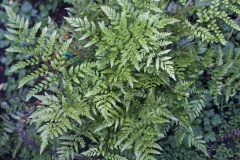Leatherleaf fern
| Infobox on Leatherleaf fern | |
|---|---|
| Example of Leatherleaf fern |  |
| Facts | |
| Origin | - |
| Stowage factor (in m3/t) | - |
| Humidity / moisture | - |
| Ventilation | - |
| Risk factors | See text |
Leatherleaf fern
Contents
Description / Shipment / Storage / Risk factors
Scientific Name and Introduction
Rumohra adiantiformis. By far the most popular cut foliage for use in arrangements, with year-round availability and good display life. Leatherleaf fern is grown in shade-houses under sub-tropical conditions. The specific epithet adiantiformis indicates the similarity to the fronds of Adiantum, the maidenhair fern. The Greek "adianton" means unwettable - a reference to the fact that fern fronds shed water. It is probably the most commonly used floral green.
Quality Characteristics and Criteria
Avoid wilted or yellow fronds.
Grading and Bunching
N.a.
Ethylene Sensitivity
No.
Pretreatments
N.a.
Storage Conditions
1°C to 6ºC.
Packing
N.a.
Special Considerations
Frond curl or postharvest wilt is a disorder that occurs more frequently from July to November. The precise cause of this disorder is not known and it cannot be prevented at grower, wholesale, or retail levels. Water stress can make the frond curl worse; however, leatherleaf is very tolerant to water stress conditions when frond curl is not a problem. The use of some postharvest anti-transpirant (wax-type) dips can enhance vase-life but does not reduce frond curl. Dipping leatherleaf in plain tap water can reduce vase-life. The brown bumps (sori or fruit-dots) found on the back of some leaves (fronds) have not been reported to reduce life.
Sources used
BMT De Beer’s Consolidated Manual on (Dutch) Flower Bulbs, cut flowers/greens and potted plants











